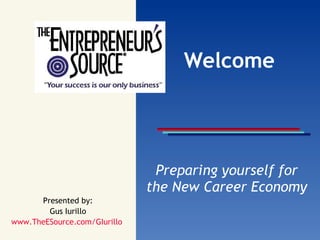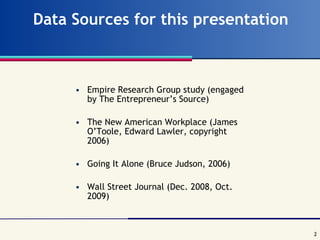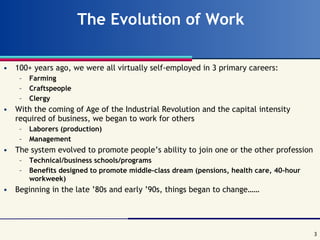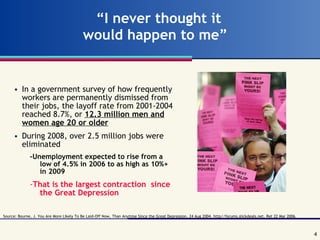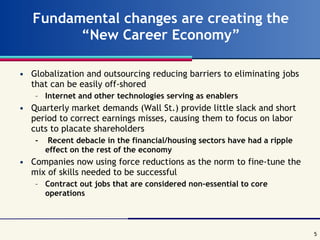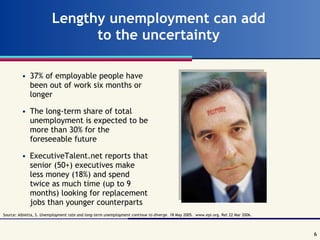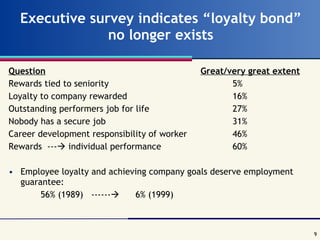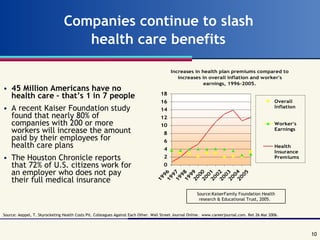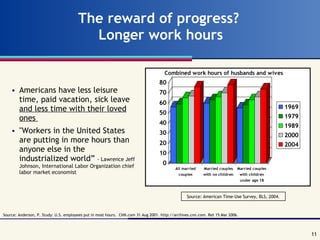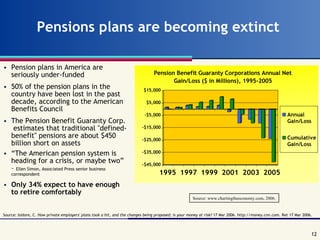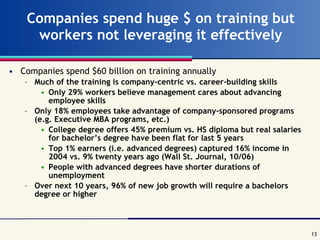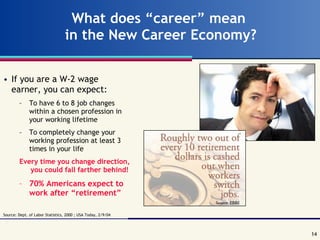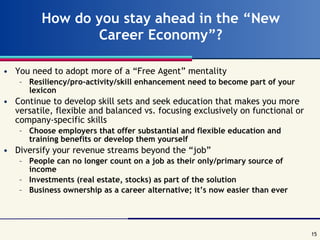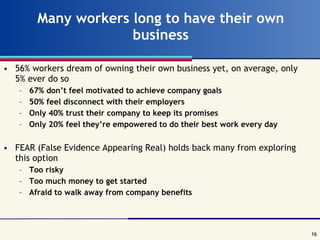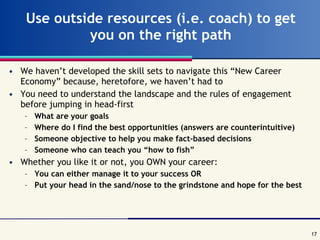New Career Economy
- 1. Welcome Preparing yourself for the New Career Economy Presented by: Gus Iurillo www.TheESource.com/GIurillo
- 2. Data Sources for this presentation Empire Research Group study (engaged by The EntrepreneurŌĆÖs Source) The New American Workplace (James OŌĆÖToole, Edward Lawler, copyright 2006) Going It Alone (Bruce Judson, 2006) Wall Street Journal (Dec. 2008, Oct. 2009)
- 3. The Evolution of Work 100+ years ago, we were all virtually self-employed in 3 primary careers: Farming Craftspeople Clergy With the coming of Age of the Industrial Revolution and the capital intensity required of business, we began to work for others Laborers (production) Management The system evolved to promote peopleŌĆÖs ability to join one or the other profession Technical/business schools/programs Benefits designed to promote middle-class dream (pensions, health care, 40-hour workweek) Beginning in the late ŌĆÖ80s and early ŌĆÖ90s, things began to changeŌĆ”ŌĆ”
- 4. ŌĆ£ I never thought it would happen to meŌĆØ In a government survey of how frequently workers are permanently dismissed from their jobs, the layoff rate from 2001-2004 reached 8.7%, or 12.3 million men and women age 20 or older During 2008, over 2.5 million jobs were eliminated -Unemployment expected to rise from a low of 4.5% in 2006 to as high as 10%+ in 2009 - That is the largest contraction since the Great Depression Source: Bourne, J. You Are More Likely To Be Laid-Off Now, Than Anytime Since the Great Depression. 24 Aug 2004. http//forums.slickdeals.net. Ret 22 Mar 2006.
- 5. Fundamental changes are creating the ŌĆ£New Career EconomyŌĆØ Globalization and outsourcing reducing barriers to eliminating jobs that can be easily off-shored Internet and other technologies serving as enablers Quarterly market demands (Wall St.) provide little slack and short period to correct earnings misses, causing them to focus on labor cuts to placate shareholders - Recent debacle in the financial/housing sectors have had a ripple effect on the rest of the economy Companies now using force reductions as the norm to fine-tune the mix of skills needed to be successful Contract out jobs that are considered non-essential to core operations
- 6. Lengthy unemployment can add to the uncertainty 37% of employable people have been out of work six months or longer The long-term share of total unemployment is expected to be more than 30% for the foreseeable future ExecutiveTalent.net reports that senior (50+) executives make less money (18%) and spend twice as much time (up to 9 months) looking for replacement jobs than younger counterparts Source: Albietta, S. Unemployment rate and long-term unemployment continue to diverge . 18 May 2005. www.epi.org. Ret 22 Mar 2006.
- 7. People are working harder without realizing the benefits Most Fortune 500 companies have increased sales while reducing workforce Between 1975 and 2004, productivity increased 65% while median family income only up 22% One organization doubled sales while halving number employees over 5-year period 27% workers feel often overwhelmed at work 25% report that work pressure is excessive
- 8. Most incremental benefits accruing only to most senior executives in organization Between 1970 and 2000, average CEO pay increased from 39x average worker pay to 400X average worker pay ($10.8MM) CEO pay +571% during ŌĆÖ90s vs. 37% for average worker Majority of long-term compensation (stock options) also accrued to senior management: 75% to CEO 15% (next 50 executives) 10% (everybody else)
- 9. Executive survey indicates ŌĆ£loyalty bondŌĆØ no longer exists Question Great/very great extent Rewards tied to seniority 5% Loyalty to company rewarded 16% Outstanding performers job for life 27% Nobody has a secure job 31% Career development responsibility of worker 46% Rewards --- ’āĀ individual performance 60% Employee loyalty and achieving company goals deserve employment guarantee: 56% (1989) ------ ’āĀ 6% (1999)
- 10. Companies continue to slash health care benefits 45 Million Americans have no health care ŌĆō thatŌĆÖs 1 in 7 people A recent Kaiser Foundation study found that nearly 80% of companies with 200 or more workers will increase the amount paid by their employees for health care plans The Houston Chronicle reports that 72% of U.S. citizens work for an employer who does not pay their full medical insurance Source: Aeppel, T. Skyrocketing Health Costs Pit. Colleagues Against Each Other. Wall Street Journal Online. www.careerjournal.com. Ret 26 Mar 2006. Source:KaiserFamily Foundation Health research & Educational Trust, 2005.
- 11. The reward of progress? Longer work hours Americans have less leisure time, paid vacation, sick leave and less time with their loved ones "Workers in the United States are putting in more hours than anyone else in the industrialized worldŌĆØ - Lawrence Jeff Johnson, International Labor Organization chief labor market economist Source: Anderson, P. Study: U.S. employees put in most hours. CNN.com 31 Aug 2001. http://archives.cnn.com. Ret 15 Mar 2006. Source: American Time-Use Survey, BLS, 2004.
- 12. Pensions plans are becoming extinct Pension plans in America are seriously under-funded 50% of the pension plans in the country have been lost in the past decade, according to the American Benefits Council The Pension Benefit Guaranty Corp. estimates that traditional "defined-benefit" pensions are about $450 billion short on assets ŌĆ£ The American pension system is heading for a crisis, or maybe twoŌĆØ ŌĆō Ellen Simon, Associated Press senior business correspondent Only 34% expect to have enough to retire comfortably Source: Isidore, C. How private employers' plans took a hit, and the changes being proposed; is your money at risk? 17 Mar 2006. http://money.cnn.com. Ret 17 Mar 2006. Source: www.chartingtheeconomy.com, 2006.
- 13. Companies spend huge $ on training but workers not leveraging it effectively Companies spend $60 billion on training annually Much of the training is company-centric vs. career-building skills Only 29% workers believe management cares about advancing employee skills Only 18% employees take advantage of company-sponsored programs (e.g. Executive MBA programs, etc.) College degree offers 45% premium vs. HS diploma but real salaries for bachelorŌĆÖs degree have been flat for last 5 years Top 1% earners (i.e. advanced degrees) captured 16% income in 2004 vs. 9% twenty years ago (Wall St. Journal, 10/06) People with advanced degrees have shorter durations of unemployment Over next 10 years, 96% of new job growth will require a bachelors degree or higher
- 14. What does ŌĆ£careerŌĆØ mean in the New Career Economy? If you are a W-2 wage earner, you can expect: To have 6 to 8 job changes within a chosen profession in your working lifetime To completely change your working profession at least 3 times in your life Every time you change direction, you could fall farther behind! 70% Americans expect to work after ŌĆ£retirementŌĆØ Source: Dept. of Labor Statistics, 2000 ; USA Today, 2/9/04
- 15. How do you stay ahead in the ŌĆ£New Career EconomyŌĆØ? You need to adopt more of a ŌĆ£Free AgentŌĆØ mentality Resiliency/pro-activity/skill enhancement need to become part of your lexicon Continue to develop skill sets and seek education that makes you more versatile, flexible and balanced vs. focusing exclusively on functional or company-specific skills Choose employers that offer substantial and flexible education and training benefits or develop them yourself Diversify your revenue streams beyond the ŌĆ£jobŌĆØ People can no longer count on a job as their only/primary source of income Investments (real estate, stocks) as part of the solution Business ownership as a career alternative; itŌĆÖs now easier than ever
- 16. Many workers long to have their own business 56% workers dream of owning their own business yet, on average, only 5% ever do so 67% donŌĆÖt feel motivated to achieve company goals 50% feel disconnect with their employers Only 40% trust their company to keep its promises Only 20% feel theyŌĆÖre empowered to do their best work every day FEAR (False Evidence Appearing Real) holds back many from exploring this option Too risky Too much money to get started Afraid to walk away from company benefits
- 17. Use outside resources (i.e. coach) to get you on the right path We havenŌĆÖt developed the skill sets to navigate this ŌĆ£New Career EconomyŌĆØ because, heretofore, we havenŌĆÖt had to You need to understand the landscape and the rules of engagement before jumping in head-first What are your goals Where do I find the best opportunities (answers are counterintuitive) Someone objective to help you make fact-based decisions Someone who can teach you ŌĆ£how to fishŌĆØ Whether you like it or not, you OWN your career: You can either manage it to your success OR Put your head in the sand/nose to the grindstone and hope for the best
- 18. Self-Employed vs. Business Owner Take a hobby/pastime/functional expertise and turn into a business that revolves around them doing this activity (e.g. like to cook ŌĆō start a restaurant) ŌĆ£ Work in the businessŌĆØ - 60+ hours/week doing the actual work of the business Generally donŌĆÖt make it or wind-up scraping by on $30-60K year, if lucky, and no equity-build because they are the business Wind-up hating what they do because they took a perfectly good pastime and turned it into something they ŌĆ£have to doŌĆØ Determine what activities they are good at/enjoy doing and find/develop a business that allows them to ŌĆ£do what they loveŌĆØ (e.g. like to work with clients ŌĆō develop/find a great B to B concept) ŌĆ£ Work on the businessŌĆØ ŌĆō 40 or fewer hours/week driving strategy/fine-tuning the system System allows them to generate 6-figure income, continue to grow as desired and build equity for long-term Enjoy what they do because they create a system over time that aligns with their life goals (personal, professional, financial) Self-Employed Business Owner
- 19. Why use a business ownership coach? 56% of corporate employees desire to own their own business but only 5% do on their own The majority of franchises succeed but 35% of owners wish they had chosen a different franchise, after the fact 95% of our clients ultimately discover an option that they said they would not have considered on their own 9 out of 10 of our clients discover the right option from the 1st 3-4 concepts we present them
